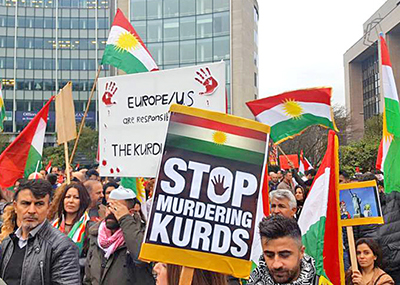
Vol. 81/No. 44 November 27, 2017
(lead article)
Tehran, Saudi rulers contend over Mideast
Kurds fight attacks amid growing conflicts

The Saudi monarchy is seeking to counter Tehran, taking steps to curb the sprawling network of emirs and other princelings pursuing their own interests and to deepen alliances with other bourgeois Arab regimes in the region.
With the defeat of Islamic State in all but a few isolated areas in Syria and Iraq, Washington — and Tel Aviv, Cairo, Ankara and other capitalist regimes there — are also looking to position themselves to advance their interests.
Tehran has made the most gains. Iranian Revolutionary Guard officers, Hezbollah fighters and Shiite-based militias, backed by Moscow’s air power, have pushed back the efforts of the Syrian people to bring down the dictatorial rule of Bashar al-Assad. And Guard leaders and the Hashd al-Shaabi militia have strengthened the rule of the pro-Tehran rulers in Iraq.
They have pushed back the Kurds as well. With a green light from Washington, these forces seized Kirkuk and pushed the Kurds out of more than 30 percent of the territory they have controlled and defended against assaults from Islamic State.
Tehran is one of the most developed capitalist countries in the Middle East, with increasing aid from Beijing and Moscow in getting credit and expanding trade.
In contrast, monarchical rule and a backward social structure in Saudi Arabia have held back capitalist development in the kingdom, despite its massive oil reserves. In a move aimed at altering this situation, Crown Prince Mohammed bin Salman, the son of the king, has led a deep-going purge against other ruling family members, including current and former ministers, as well as steps to reel in the semi-autonomous power of the Wahhabi Muslim ministry there.
Riyadh has announced plans to solicit investment in government-run Saudi Aramco, the largest oil producer in the world, worth an estimated $2 trillion. The British government has promised a $2 billion loan guarantee to Saudi Aramco if the oil company’s stock offering is made on their exchange, while President Donald Trump has urged Saudi rulers to remember that using the New York Stock Exchange for the offering is “important to the United States.”
The regime is also promoting more modern bourgeois social relations, including ending restrictions on women’s right to drive and participate more broadly in public life.
The Saudi rulers immediate focus is on preventing Hezbollah and Tehran from strengthening their position in Lebanon. Riyadh has charged Tehran with attempting to start a war there. They got the pro-Saudi Lebanese Prime Minister Saad Hariri to announce his resignation from the Saudi capital, saying he feared he was targeted for death. Riyadh also called for its citizens in Lebanon to get out “as soon as possible.”
U.S. rulers pursue imperial interests
The propertied rulers in Washington, far and away the strongest imperialist power worldwide, back the Saudis drive to stem Tehran’s advances, as they seek to impose a measure of stability for their interests in the region.
The Trump administration is planning to strengthen Washington’s position, as well as that of Riyadh, Tel Aviv and its other allies, by pressing for what the president calls “the ultimate deal” between Israel and the Palestinians.
Washington is getting help from the rulers in Egypt as well as Saudi Arabia in pressing both the Palestinian Authority on the West Bank and Hamas in the Gaza Strip.
Washington finds the moment “ripe” for this push, the New York Times reported Nov. 12, because these Arab regimes want to “refocus attention on Iran.”
Trump is getting bipartisan backing for the effort, with former Barack Obama Mideast adviser Dennis Ross saying his team has “done a very good job.”
Washington has set up some 13 military bases across Syria, most of which were aimed at collaboration with the Kurdish-led Syrian Democratic Forces in beating back Islamic State, while simultaneously attempting to prevent Hezbollah and Syrian troops from connecting a route for Tehran from the Iraqi border across Syria to Lebanon.
The Assad regime now says they plan to push the SDF out of Raqqa and parts of Deir el-Zour province they have taken from Islamic State. The question is whether Washington will “negotiate” this territory away from the Kurd-led forces.
Meeting in Vietnam as part of the Asia-Pacific Economic Cooperation summit Nov. 11, Russian President Vladimir Putin and President Trump agreed to maintain the “deconfliction” channels between their militaries in Syria. Opposing Kurdish independence, they both reaffirmed backing for Syria’s territorial sovereignty.
U.S. weapons used on Kurds in Iraq
In an interview with CNN’s Christiane Amanpour, Kurdistan’s former President Masoud Barzani elaborated on the role played by Washington in ensuring Kurdistan’s independence referendum, which was approved by over 92 percent, would not be implemented and after the vote permitted the use of U.S. weaponry in attacks against Kurdistan by Iraqi forces and Iranian-backed Hashd al-Shaabi militia.
“I was not surprised that the Iraqi forces attacked Kurdistan,” said Barzani. “But what surprised me greatly was the people whom America had listed as terrorists [Iranian militias], attacked us with American weapons under the eyes of American officers and officials.”
The 30 million Kurds living within Iraq, Turkey, Syria and Iran are the largest nationality worldwide without their own state.
Barzani said Tehran and Baghdad were planning to attack the Kurds whether they conducted the independence vote or not. “If we would have lost our will, it would have been much bigger than losing some of the areas temporarily,” he said.
Front page (for this issue) | Home | Text-version home